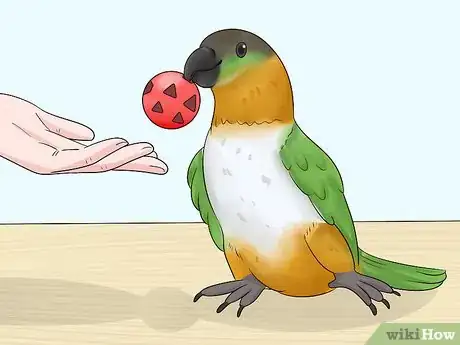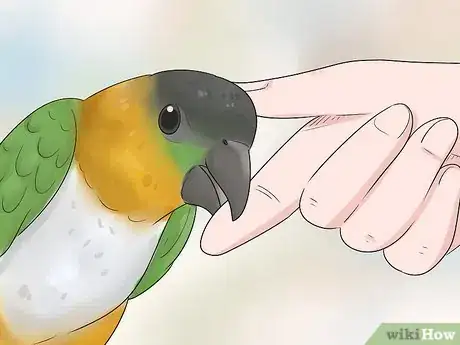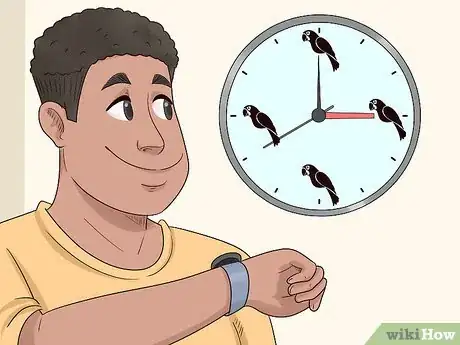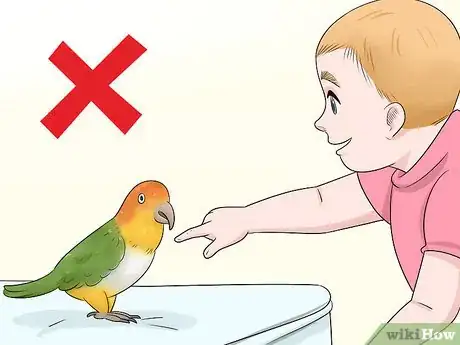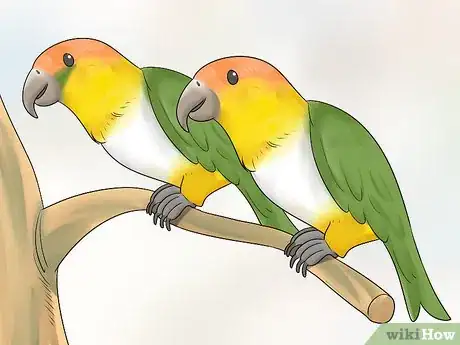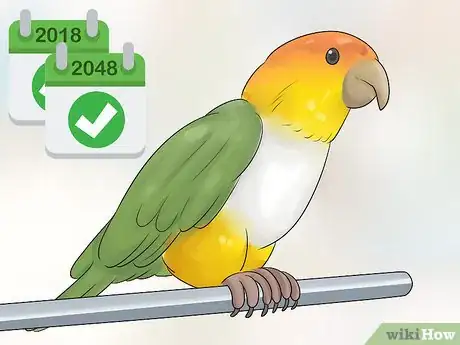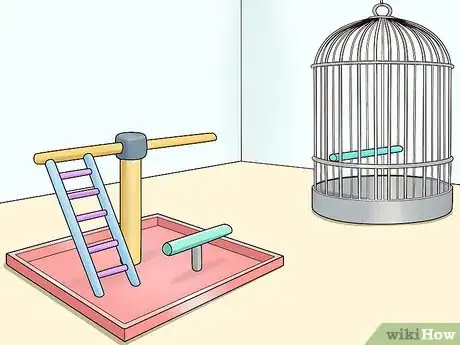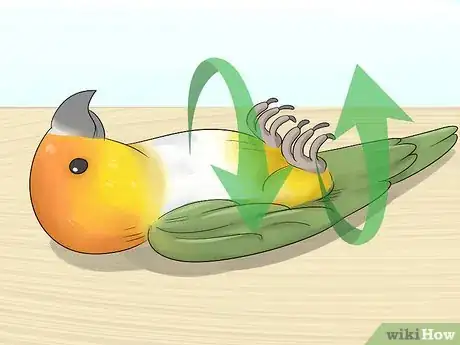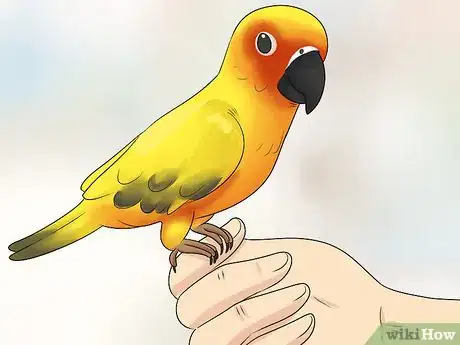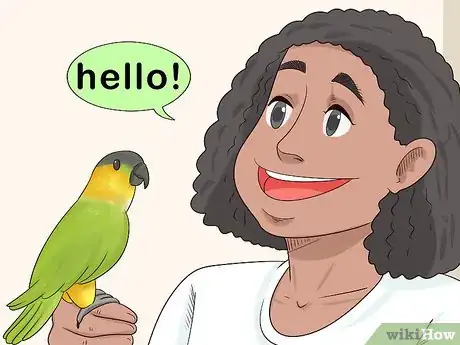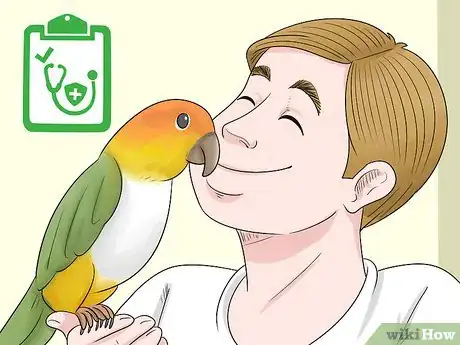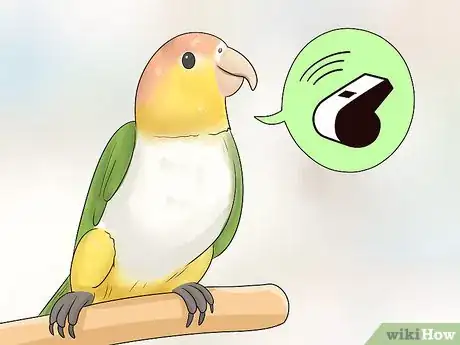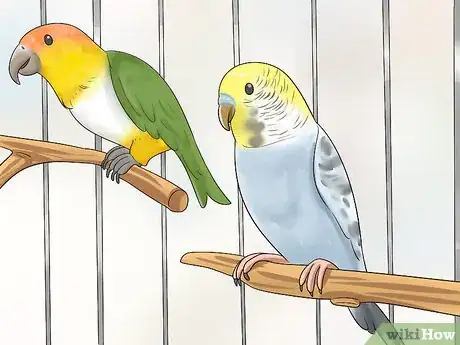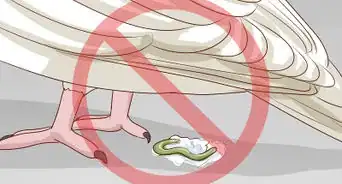This article was co-authored by Melissa Nelson, DVM, PhD. Dr. Nelson is a Veterinarian who specializes in Companion and Large Animal Medicine in Minnesota, where she has over 18 years of experience as a veterinarian in a rural clinic. She received her Doctor of Veterinary Medicine from the University of Minnesota in 1998.
There are 10 references cited in this article, which can be found at the bottom of the page.
This article has been viewed 40,712 times.
Caique parrots are beloved for their playful curiosity and silly antics. Before you adopt one of these fascinating birds, however, you should carefully consider whether you can keep up with their active lifestyle. Caiques require plenty of attention, training, and exercise to keep them happy. They also need a good home with lots of toys, food, and space to roam. While caiques can be great pets for a dedicated owner, take time to think about whether they are the best type of parrot for you.
Steps
Assessing Your Lifestyle
-
1Choose a caique if you want a playful bird. Caiques are great birds for people who want to play and cuddle with their bird. This means that you have to spend at least an hour hanging out with your caique every day. If given enough time everyday, caiques will quickly bond with their owners.
- Caiques are not good pets if you want a bird to watch but not to interact with. If you want a good cage bird, consider canaries or finches instead.
- Bored caiques can become loud or destructive. They may even start plucking their own feathers.
-
2Decide if you can live with nipping. Caiques are very territorial. Even well-behaved caiques may nip when they are stressed or if you reach inside their cage. Nipping can be trained out of some caiques, but you should not get a caique if you can't tolerate nipping.[1]Advertisement
-
3Figure out how much time you have for a caique. Caiques crave attention, and they need plenty of human interaction to be healthy, happy birds. Make sure that you have enough time for a caique in your life. A routine for a caique owner might include:[2]
- Daily cleaning of food and water dishes.
- Weekly cage cleanings.
- Annual vet examinations.
- Daily training sessions for young birds.
- Supervising the caique at least once a day as they fly out of their cage. They may not actually fly much, but the birds do enjoy walking, crawling, and hopping around.
-
4Evaluate your household. Caiques are social birds. Their territorial behavior may be reduced if they are handled by many people while they are still young. If you have multiple people in your household, a caique may be a good fit. That said, because of their nipping, caiques may not be a good pet for children.[3]
- If you have dogs or cats, they will need to be in a different room while your caique is out of their cage.
-
5Consider getting two birds if you work during the day. If you get a pair of male and female caiques, they will be very happy to socialize with each other while you are gone during the day. This can help reduce loneliness and destructive behavior.
- If you are getting pairs, you should get the caiques while they are young. You will still need to play and interact with both birds.
- If you get an older caique, it may be best to keep them alone.
- Caiques of the same sex may become territorial or fight if kept in a cage together.
- Caiques are difficult to breed, but opposite-sexed birds will result in eggs. You can try to prevent this by placing fake eggs in the cage.[4]
Living with Caiques
-
1Commit to their long lifespan. A healthy caique can live for around thirty years. This means that getting one can be a lifelong commitment. Make sure that you are willing to care for them this long. If you are unsure, you may want to consider a bird with a shorter lifespan, such as a parakeet.
-
2Determine if your home is suitable for caiques. Caiques are noisy and active birds who need plenty of room to sprawl. They will need a large cage and a play gym set up outside of the cage. Consider if your home is right for a caique.[5]
- Caiques will need cages that are at least 24 inches (61 cm) long and 24 inches (61 cm) high.
- Since caiques, like most parrots, can screech, they may not be a good pet for people living in apartments.
- You will need to remove any plants from your home that are poisonous to birds, such as elephant’s ear, oleander, or rhododendrons.[6]
-
3Expect to invest in plenty of toys. To keep caiques busy, you will need to give them a variety of toys that they can peck, chew, unravel, and forage. Although they are a smaller parrot, caiques might require toys designed for large parrots, as they can quickly destroy smaller toys. Some great toys for caiques include:[7]
- Foraging baskets.
- Ropes.
- Key chains with bells.
- Vine balls.
- Wooden chewing blocks.
-
4Prepare to give a caique a varied diet. A caique cannot live on a seed-only diet. They need a varied diet that includes pellets, vegetables, fruits, sprouts, and occasionally nectar. Make sure you are ready to fulfill the caique’s diverse nutritional needs.[8]
- Never give a caique avocado, chocolate, or honey, as these may harm them.
-
5Expect your bird to roll around and play. Caiques like to do their own version of "surfing" by rubbing their face, wings, and body against surfaces. They may also enjoy pretend "wrestling," during which they will roll on their backs. This is a fun game for the parrot.
Comparing Caiques with Other Parrots
-
1Pick a gentler parrot if you’re a first-time bird owner. Caiques are more difficult to train than other parrots. They need consistent and constant guidance to reduce aggressive behaviors. If you do not have much experience with birds, you may want to choose a more laid-back parrot, such as a conure or a lovebird.
-
2Choose a caique if you're looking to teach them words. Caiques are not as good at talking as larger parrots, such as African Greys or Amazons. Among the smaller varieties of parrots, however, they are considered to have good speaking ability. Their speaking voice is higher pitched than other parrots.[9]
-
3Get a caique if you want a healthy species of parrot. While caiques are vulnerable to the same diseases as all parrots, they tend to be a very healthy bird. The only consistent health problem that they may face is called polyomavirus, which usually only affects birds under the age of four weeks.
-
4Adopt a caique if you want a quieter parrot. Caiques can screech when they want something, but in general, they are quieter than other parrots. They may not squawk or scream as much as other parrots. Instead, they will whistle.[10]
-
5Consider another bird if you have an aviary. Caiques generally don’t get along with other breeds of bird. They may become territorial over their space and start fights. If you’re looking for a parrot to add to a diverse aviary, consider parakeets.[11]
References
- ↑ https://www.beautyofbirds.com/caiquesaspets.html
- ↑ http://www.petyak.com/birds/general-bird/articles/white-bellied-caique/
- ↑ https://www.beautyofbirds.com/caiquesaspets.html
- ↑ http://animal-world.com/encyclo/birds/Caiques/CaiquesProfile.htm
- ↑ https://rightpet.com/breed-species/bird/black-headed-caique
- ↑ http://www.peteducation.com/article.cfm?c=15+1912&aid=2236
- ↑ https://www.beautyofbirds.com/caiquehousing.html
- ↑ https://rightpet.com/breed-species/bird/black-headed-caique
- ↑ http://www.birds.com/blog/keeping-a-pet-caique/
About This Article
To know if a caique parrot is right for you, keep in mind that caiques require a lot of attention, and you'll need to have enough free time for daily training and play sessions. Also, know that caique parrots are territorial and nip a lot, so a caique might not be the best choice if you have children. However, if you're OK with the nipping, have plenty of free time every day, and want a bird that loves to play and cuddle, a caique parrot might be right for you! For more advice from our Veterinary co-author, like how to raise a caique, scroll down!
